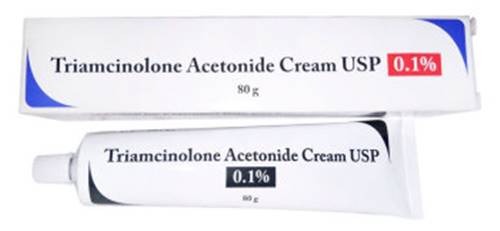Triamcinolone acetonide cream is a topical corticosteroid. It is frequently used to treat various skin conditions characterized by itching, discomfort, and inflammation. While its main purpose is not skin lightening, some people have noticed changes in skin pigmentation when they use this cream. In this post, we’ll explore the effects of triamcinolone acetonide cream on skin lightening and provide insights into its usage.
Understanding Triamcinolone Acetonide Cream
Triamcinolone acetonide is a synthetic corticosteroid that works by suppressing the immune response and reducing inflammation in the affected area. It is prescribed to treat conditions such as dermatitis, psoriasis, eczema, and certain types of rashes. The cream helps relieve swelling, redness, and itching associated with these skin problems, promoting improved skin health and relief.
Does Triamcinolone Acetonide Cream Lighten Skin? Effects on Skin Pigmentation

While triamcinolone acetonide cream is not specially designed for skin lightening, some people, when using this topical corticosteroid, have reported changes in skin pigmentation. These changes are not uniform and can vary from one individual to another. The skin-lightening effect occurs due to the corticosteroid’s ability to suppress the immune response, reduce inflammation, and potentially alter the melanin production. (Melanin: the pigment responsible for skin color).
The possible skin-lightening effects of this cream may be more noticeable in people with conditions that cause hyperpigmentation, where some areas of the skin become darker than the surrounding skin. In such cases, skin irritation brought about by the corticosteroid and the reduction of inflammation might lead to a gradual evening out of skin tone, resulting in a lighter skin appearance in the treated areas.
Important Considerations
- Risk of Side Effects: While triamcinolone acetonide cream can be quite effective in treating some skin conditions, it may also have potential side effects. These can include skin irritation, skin thinning, acne, and even rebound inflammation if the cream is stopped abruptly.
- Individual Variability: The lightening effects of triamcinolone acetonide cream on skin pigmentation can vary greatly from one individual to another. Some individuals may experience noticeable changes, while others may not observe any difference at all.
- Medical Supervision: It is very important to use triamcinolone acetonide cream under the guidance of a dermatologist or a medical professional. Especially with prescription medications, self-treatment can lead to complications and unintended side effects.
- Short-Term vs. Long-Term Use: Any changes in skin pigmentation that occur with this cream use are mostly temporary and typically resolve once the cream is discontinued. However, excessive and prolonged use of topical corticosteroids can cause skin thinning, making the skin more susceptible to discoloration or lightening.
Using Triamcinolone Acetonide Cream Safely
If you are prescribed this cream for a specific skin condition, here are some important guidelines to follow:
- Patch Test: Before using the cream to larger areas of your skin, conduct a patch test to check for any sensitivities or adverse reactions.
- Follow Your Doctor’s Instructions: Use and apply the cream exactly as directed by your healthcare provider. Don’t use more or less of the medication than prescribed.
- Avoid Sensitive Areas: Do not apply the cream to sensitive areas such as the groin, face, or armpits unless specifically directed by your doctor.
- Monitor Your Skin: Pay attention to changes in your skin, including sensitivity, texture, or changes in color. If you notice any concerning effects, consult your doctor.
- Limit Usage: Do not use the cream for an extended period unless instructed by your doctor. Prolonged use of this cream can lead to unwanted side effects.
FAQs
Is triamcinolone acetonide cream effective for lightening hyperpigmentation?
Triamcinolone acetonide cream is not typically used for lightening hyperpigmentation. It is a corticosteroid primarily used to treat skin conditions like psoriasis and eczema and inflammation. Ingredients like retinoids or hydroquinone are often more effective for hyperpigmentation.
How does triamcinolone acetonide cream work to lighten skin tone?
Triamcinolone acetonide cream primarily suppresses the immune response and reduces inflammation. It is not designed for treating hyperpigmentation or lightening skin tone. Other treatments are more suitable for that purpose.
Can triamcinolone acetonide cream be used to lighten scars?
Triamcinolone acetonide cream may slightly enhance the appearance of scars by reducing itching and inflammation. However, it’s not a primary treatment for lightening scar. Consult a dermatologist for better options.
Is triamcinolone acetonide cream a safe option for lightening melasma?
Triamcinolone acetonide cream is usually not recommended for lightening melasma. Melasma requires specific treatments like sun protection, retinoids, and hydroquinone.
Are there alternative treatments to triamcinolone acetonide cream for skin lightening?
Yes, there are alternative treatments for skin lightening, such as vitamin C serums, kojic acid, retinoids, hydroquinone, and glycolic acid.
Can triamcinolone acetonide cream be used to lighten specific areas of the body?
For targeted skin lightening, triamcinolone acetonide cream is not recommended. It’s a corticosteroid used for inflammation.
How long does it take to see results when using triamcinolone acetonide cream for skin lightening?
Triamcinolone acetonide cream isn’t typically used for skin lightening.
Are there any potential interactions between triamcinolone acetonide cream and other skin lightening products?
Using triamcinolone acetonide cream with other skin lightening products may increase the risk of side effects like increased sensitivity or thinning of the skin. It’s vital to consult a dermatologist before combining different products to be sure effectiveness and safety.
Does the potency of triamcinolone acetonide cream affect its ability to lighten skin?
The potency of triamcinolone acetonide cream is not related to its ability to lighten skin directly. it’s not a recommended treatment for skin lightening, its primary function is to reduce inflammation.
Can triamcinolone acetonide cream help to lighten acne scars?
Triamcinolone acetonide cream might slightly enhance the appearance of acne scars thanks to its anti-inflammatory properties, but it’s not a primary treatment for scar lightening.
What are the long-term effects of using triamcinolone acetonide cream for skin lightening?
Using triamcinolone acetonide cream long-term for skin lightening can cause increased susceptibility to infections, skin thinning, and other potential side effects.
Has triamcinolone acetonide cream been approved by dermatologists for safe and effective skin lightening?
For skin lightening purposes, triamcinolone acetonide cream is not approved by dermatologists. It’s primarily used to treat skin conditions and inflammation, not for cosmetic purposes like skin lightening.
Conclusion
Triamcinolone acetonide cream is primarily prescribed to relieve discomfort and inflammation associated with differen skin conditions. While some people have observed some changes in skin pigmentation during its use, these effects are not its primary intended purpose and can vary.
If you are considering using medication or triamcinolone acetonide cream for skin-related concerns, it is vital to consult a medical professional for recommendations and personalized guidance. Self-treatment with prescription medications can cause potential harm to your skin and unintended consequences. Always seek professional medical advice and prioritize your skin health when making decisions about your skincare routine.


